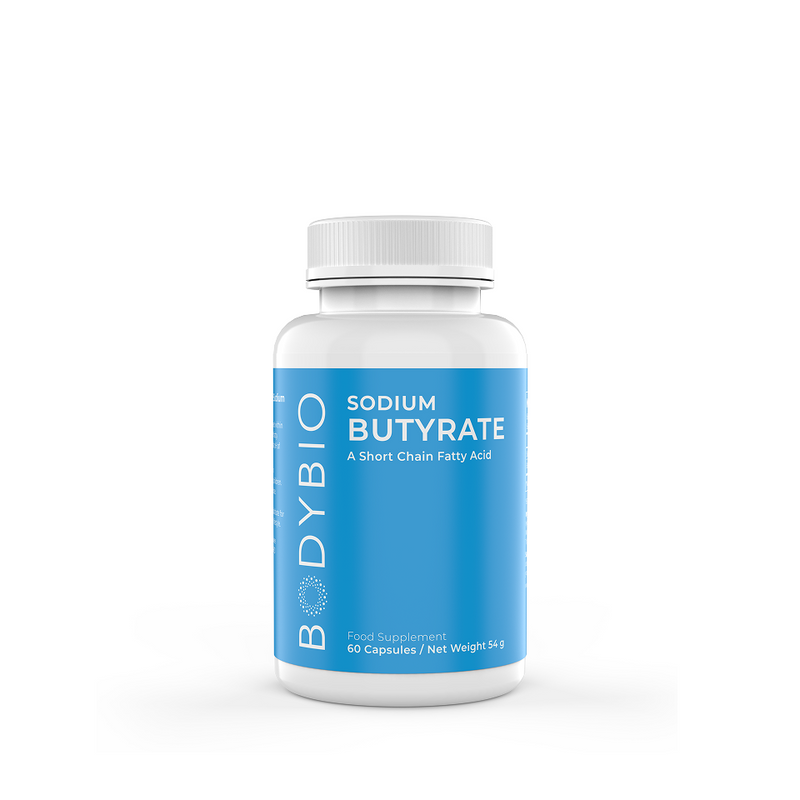Diabetes and Gut Health: What is the Gut Microbiome-Diabetes Connection?
For decades, diabetes has been treated within conventional medicine only when symptoms become overt and difficult to manage. At that stage, drugs like sulfonylureas and biguanides are used to lower blood sugar and increase insulin production, but of course, this only masks the root cause issue(s), often a sedentary lifestyle, lack of physical exercise, and an unhealthy diet.
But there’s an even deeper issue related to these root cause factors: compromised gut health. Within the world of integrative and functional medicine, we are now realizing how interconnected gut health is to many of the most common chronic illnesses affecting Americans today, like cardiovascular disease, obesity, and diabetes [1].
As it turns out, poor gut health––low microbiome diversity, a lack of health-promoting postbiotics, and a structurally compromised gut environment––is a gateway to these metabolic diseases and many others besides. So the question becomes, how can we support gut health to prevent, manage, and even potentially heal from these life-altering diseases?
In this article, we’ll walk through the factors that lead to diabetes, the connection between diabetes and the microbiome, and managing diabetes by supporting gut health, including probiotic and postbiotic (butyrate) therapy.
What is Diabetes?
Diabetes occurs when your pancreas can’t produce enough insulin––the hormone that transports glucose into our cells––to keep up with the high amount of glucose in your blood; this is what people mean when they say they have high blood sugar. Diabetes results in symptoms like:
- Frequent urination, especially at night
- Excessive hunger and thirst
- Blurry vision
- Fatigue
- Frequent infections
- Dry skin
- Numb/tingling hands and feet.
As diabetes progresses, worsening symptoms like chronic kidney disease, damage to blood vessels and nerves, and diabetic ketoacidosis may require emergency services and continuous medical attention.
What Factors Lead to Diabetes?
As you may know, there are two types of diabetes, 1 and 2. Type 1 diabetes is a little more serious in nature and we know less about what exactly causes it. But we have a clear picture of type 2 diabetes as an illness brought about by poor diet and lifestyle habits, and probably some genetic and environmental contribution.
Type 1 Diabetes Causes
Type 1 diabetes is thought to be an autoimmune disease where the immune system attacks the pancreas, destroying the beta cells that make insulin. Unlike type 2 diabetes, type 1 is thought to be more influenced by genetics and often manifests itself in childhood. It may be instigated by a threat to the immune system such as a virus that causes the immune system to become over-reactive and attack the body.
Though type 1 diabetes is not directly caused by diet and lifestyle factors, it can be managed through similar dietary and lifestyle recommendations as type 2, in addition to supplementing insulin [4, 5].
Type 2 Diabetes Causes
Type 2 diabetes has a lot more inputs in terms of potential causes, but it can also be treated by taking steps to reverse those causes. Causes behind type 2 diabetes include:
- Obesity: Obesity or being overweight is thought to be one of the biggest predisposing factors to developing type 2 diabetes. Likely, this is due to a lack of physical exercise, chronically high stress, and eating the Standard American Diet. You can also develop type 2 diabetes without being overweight, however.
- Low-fiber, low-nutrient, high-sugar diet: The Standard American Diet is high in processed foods, industrial seed oils, and sugar, as well as low in fiber and nutrient-rich fruits and vegetables, legumes, whole grains, and complete proteins. Research has shown that this diet contributes to the development of many chronic diseases [6].
- Lack of exercise: Regular physical exercise helps the body use glucose as fuel, taking it out of the bloodstream. When we are not exercising regularly, glucose is more likely to build up in the blood and go unused, leading to insulin resistance [7, 8].
- Oxidative stress: Oxidative stress develops when the body accumulates too many free radicals (a toxic byproduct) through normal cellular metabolic reactions as well as external inputs like pollution, medications, cigarette smoke, etc. Left unregulated, free radicals can tip the body towards disease and dysregulation [9].
- Working night shift: Human beings are meant to sleep at night and be awake and active during daylight; when this pattern is thrown off, the body can easily become fatigued, dysregulated, and inflamed, leading to increased risk of chronic disease.
- Genetic factors: Genetics and epigenetics can certainly influence the development of type 2 diabetes, but they are not the end-all-be-all. It takes a combination of genetic and lifestyle factors to cause type 2 diabetes, and sometimes genetics may not play a role at all.
All of these factors can lead to insulin resistance, making the liver less responsive to the hormone insulin. Without invention via diet and lifestyle change, type 2 diabetes will develop.
Diabetes and the Microbiome
With all of these variables behind diabetes, how does the microbiome and the gut come into play?
Research shows that people with diabetes have lower levels of butyrate-producing bacteria [10]. Butyrate is a postbiotic short-chain fatty acid (SCFA) that supports healthy glucose levels, supports a healthy inflammation response, and helps to keep the microbiome balanced and running smoothly, among other benefits. Lower levels of these bacteria are likely due to low consumption of fiber-rich fruits, vegetables, and resistant starches (prebiotics) that feed these bacteria, who in turn keep the gut environment healthy and functioning optimally.
Without these healthy probiotics and the postbiotics they create for us, pathogens like candida and parasites can take over the gut, causing inflammation and compromising digestion. Once the body is inflamed, a number of conditions may develop from mood disorders to IBS to insulin resistance, which leads to diabetes.
Supporting Diabetes Through Gut Health
Once we have established that microbiome health is closely linked to diabetes health outcomes, the next question is: how can we support the microbiome? Fortunately, there are several ways that people with diabetes can improve their gut health, starting with diet, probiotics, and butyrate.
Diet for Diabetes
The foundational step for taking control of your health in any scenario is reevaluating your diet. While conventional medicine continues to recommend high-carb diets with processed foods and toxic vegetable oils for those with diabetes, functional and integrative medicine professionals are steering diabetic patients toward some different options.
For many people, a modified Paleo diet that eliminates processed foods and glutinous grains in favor of whole fruits, vegetables, animal proteins and select carbs is a great place to start [11, 12]. Others may do well on a cyclical keto diet that dramatically reduces carbs and increases protein and healthy fats [13].
There is no one right diet for every person, and finding what works best for your body usually involves some trial and error (preferably alongside a trusted nutritionist or functional doctor).
Regardless, everyone can benefit from more whole (unprocessed, unrefined) foods on rotation in their daily meals. Not only do these foods offer more nutrients for your cells, but they also add more prebiotic fiber that feeds your microbiome, which goes on to produce butyrate and other beneficial SCFAs.
Some specific foods that can help feed both you and your microbiome include:
- Resistant starches: cooled potatoes and rice, plantains, beans, and oats all feed butyrate-producing bacteria in the gut
- Coffee: high in antioxidants, supports the liver
- Green tea: also high in antioxidants and anti-inflammatory polyphenols
- Olive oil, avocado, and other healthy fats: increase satiety and keep your energy high
- Colorful produce like berries, spinach, peppers, sweet potatoes, etc. provide a range of micronutrients and antioxidants.
Probiotics and Diabetes
Probiotics have been the star of the alternative health world for many years now, and the role of probiotics in treating diabetes is becoming an increasingly popular subject.
A 2017 review on the role of probiotics in diabetes found that probiotics have been proven to lower fasting blood glucose and insulin levels in human trials [14]. Another meta-analysis of 32 randomized clinical trials published in 2020 showed that probiotics had significant positive effects on type 2 diabetes markers such as reducing total cholesterol, HbA1c, fasting insulin and plasma glucose, and blood pressure values [15].
Along with diet and lifestyle changes, probiotic supplementation could be a valuable tool for managing diabetes, but it’s not the only tool available to modulate the microbiome.
Butyrate, a Posbiotic for Diabetes
An equally powerful, if not more powerful, therapeutic tool for improving the gut environment could be butyrate, the postbiotic SCFA that some of our probiotic strains produce to feed the gut lining and keep the microbiome balanced and happy. Over 5,000 research studies have shown that butyrate plays several important roles in the gut.
A 2019 study found that supplementing sodium butyrate improved liver glycogen metabolism in mice, lowering blood sugar [16]. Another study found that oral butyrate supplementation decreased blood HbA1c, inflammatory cytokines, and endotoxic lipopolysaccharides (LPS), while gut integrity was strengthened [17].* Butyrate may be effective in supporting gut health and a healthy microbial balance [18].*
When taking a butyrate supplement as part of your diabetes support plan, you need a high-quality product you can trust. BodyBio Butyrate is free from fillers, additives, and all common allergens, just the butyrate that your gut lining and microbiome need for whole body health.
Click here to learn more about the benefits of butyrate on gut health.
Nurturing a Diabetic Gut
It seems that the more we learn about gut health, the clearer it becomes that a healthy microbiome and gut environment are integral to improving many different conditions, including diabetes.
A diabetes or insulin resistance diagnosis does not have to be the downward spiral into disease that it has been for generations; it can be a wake-up call to live a less stressful lifestyle, prioritize your diet and nutrition, and refocus your efforts on microbiome health and gut integrity. Whether it’s through probiotic therapy, butyrate supplementation, increasing antioxidants, or likely some combination of modalities, you have the power to take charge of your health and wellbeing from the inside out.









